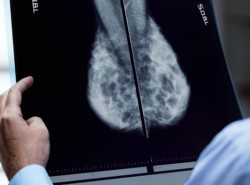
The Kathleen Cuningham Foundation Consortium for Research into Familial Breast Cancer (kConFab); a world class resource for studying the causes and consequences of hereditary breast cancer
Published: 05/11/23 8:34 AM

Christobel Saunders
Project Description: The discovery of genetic faults (such as mutations in BRCA1 and BRCA2) that predispose to the development of breast cancer was an important break-through in the understanding of hereditary breast cancer. BRCA1 and BRCA2 genetic faults are the most common cause of hereditary breast cancer, and while several other risk factors have been identified, the genetic cause of many hereditary breast cancers are unknown. It is believed that a coordinated national and international effort at both the basic and clinical level is required to uncover the remaining genetic causes of hereditary breast cancer. kConFab is a unique world class resource that collects comprehensive clinical data and biospecimens from Australian and New Zealand families with a strong history of breast and ovarian cancer and makes this resource available to researchers throughout the world, The purpose of this research proposal led by Prof Christobel Saunders (Peter McCallum Cancer Centre) is to continue to maintain and expand this valuable collection of clinical data and specimens and provide access to these resources to researchers globally to advance the understanding of hereditary breast cancer.
Why the Work is Needed: Between 5 and 27% of breast cancer cases are thought to be hereditary. While breast cancer risk factors for some of these hereditary breast cancers are known, the genetic cause of for many familial breast cancers remain to be discovered. The identification of new breast cancer risk factors in families where there is a strong family history will further the discovery of new breast cancer causing genes, assist with surveillance in high-risk families leading to earlier detection, as well as the potential discovery of new and improved treatment options.
Expected Outcomes: The outcomes of this work will continue to maintain and expand the kConFab resource to facilitate and advance world class research for studying the causes and consequences of hereditary breast cancer.
Project Details
The most common breast cancer risk factors are genetic faults in BRCA1 and BRCA2, and while several other risk factors for familial breast cancer have been identified, the genetic cause of many hereditary breast cancers are unknown. The failure to identify the genetic causes for elevated familial breast cancer severely compromises the ability to offer personalised risk reducing options for these women and their family members.
The Kathleen Cuningham Foundation Consortium for Research into Familial Aspects of Breast Cancer (kConFab) is a unique world class resource that stores clinical data and biological samples, including blood and tissue, from over 2300 families affected by breast and ovarian cancer.
Previous research using the kConFab resources has facilitated the discovery of breast, ovarian and prostate cancer-causing mutations enabling personalised risk-assessment for high-risk families. Further, research using the kConFab resource has provided the evidence required for genetic clinics to offer mutation testing and the evidence necessary to list such testing under the Medicare Benefits Schedule.
With this NBCF support, this research proposal aims to continue to maintain and expand this resource to support a broad range of research projects in familial breast, ovarian and prostate cancer, providing National and International researchers access to the resource via application to the research advisory committee. This will facilitate world class research into the understanding and management of familial breast cancer, and further the discovery of new breast cancer causing genes, better screening and early detection methods as well as the potential discovery of new and improved treatment options.